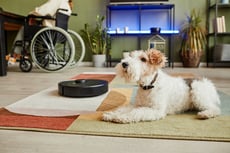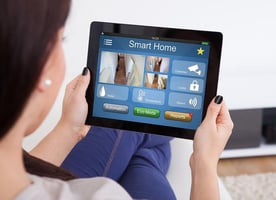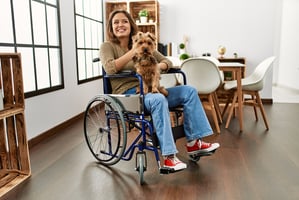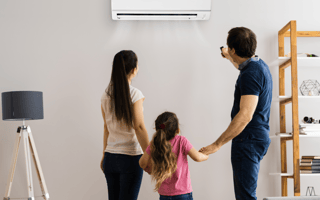When the new year rolls in, we all make a few resolutions, and, as usual, some are more realistic...
How People with Special Needs Use SMART Technology
.jpg?width=1600&name=bigstock-Side-View-Portrait-Of-African--456330201%20(1).jpg) SMART technology is everywhere. Using our phones, tablets, or laptops to perform helpful duties is becoming more popular every day. For most of us, SMART tech makes our lives easier. But here's a game-changer: people with special needs use SMART technology at home, leading to more independence.
SMART technology is everywhere. Using our phones, tablets, or laptops to perform helpful duties is becoming more popular every day. For most of us, SMART tech makes our lives easier. But here's a game-changer: people with special needs use SMART technology at home, leading to more independence.
What is SMART Technology?
The acronym ‘SMART’ stands for Self-Monitoring Analysis and Reporting Technology. It refers to any technology that allows the user to connect to the internet and remotely control a device or appliance. This technology is now present in everything from smartphones to smart TVs.
How Can SMART Technology Help People with Special Needs?
‘Special needs’ refers to emotional, physical, or mental challenges requiring assistance, often with daily living activities. SMART technology is revolutionizing lives, including the lives of people with special needs, by assisting them with many things.
- Echo and Echo Show are small, connected devices that can do an astonishing number of things. With voice-activated technology (Alexa), Echo can tell you the weather (or a joke), add to your shopping list, and find dinner recipes. You can browse the web, listen to audiobooks, and play music with Echo. If you have other SMART devices in your home, you can control them with the Echo. In addition, Echo Show can make video calls. Voice-activated calling is great for keeping in touch with family and friends. It can also save the day in an emergency if help is needed.
- SMART thermostats control the temperature in your house. Pre-programmable settings can turn the heat down when you go to bed and warm things up before you get out of bed.
- SMART home video devices work with your smartphone, computer, or tablet and allow you to see, hear, and speak to those outside your door. They can also record videos of the doorstep and surrounding area for viewing at a later time. Visibility and communication are particularly helpful for package delivery and the arrival of expected or unexpected guests. Security system alerts can be connected to helpers like fire, police, family, or trusted friends outside the home.
- SMART locks are an excellent safety measure that can bring even more security to the home of a special needs person. A SMART lock allows you to lock and unlock the door remotely through an app on your phone. Another option is to use geofencing, commonly known as invisible fencing, to set up an electronic perimeter around the building, turning it on after the door is locked.
 A robot vacuum tops many wish lists. These little robots vacuum the carpet or floors with a click of an app; no more long cords to tangle, and no pushing a vacuum. This increases independence by allowing one to clean their floors without help.
A robot vacuum tops many wish lists. These little robots vacuum the carpet or floors with a click of an app; no more long cords to tangle, and no pushing a vacuum. This increases independence by allowing one to clean their floors without help. - SMART lighting is another helpful addition. Smart devices can program lights to turn on and off or dim at specific times or on demand. Keeping areas well-lit provides safety from falls and keeps a home from looking empty, discouraging burglary.
- One of the leading names in SMART technology is Nest. Nest has many items discussed above and the technology to streamline them.
- Virtual Reality headsets have opened up new worlds of sensory enhancement and possibility for the homebound and others with disabilities.
Where Can I Get Help with SMART Technology Installation?
As always, it is wise to seek professional help to install your SMART technology. In the D.C. area, you can’t go wrong with Wilcox Electric. We are Nest Pros and offer a full line of Leviton and Samsung SmartThing devices and installation. We can set up your home, or the home of someone you love, with an integrated technology system to help keep things safe and convenient. Get in touch today.



